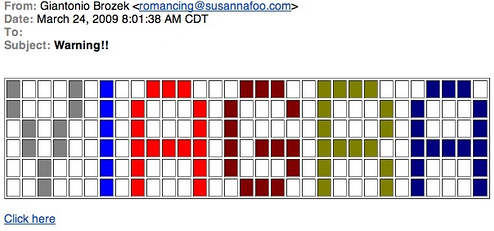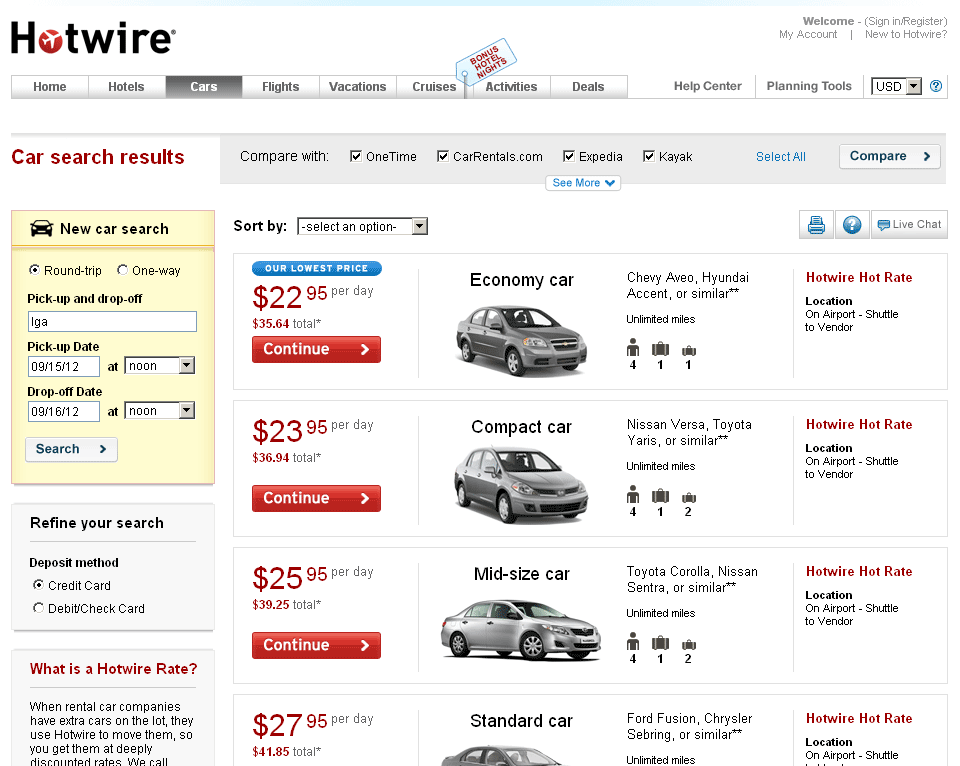Have you ever wondered what kind of difference your browsing history can make when you shop? We were surprised to see this before/after photo that reader David sent. He tells us that he was shopping Hotwire for car rentals and took screen shots before and after he cleared out the cookies in his browser. It’s striking how different prices are when Hotwire thinks that he’s a new visitor who has never been to the site before. [More]
browsing

Consumer Group Launches Anti-Google Ad In Times Square, Keeps Google Analytics On Its Own Website
The group Consumer Watchdog is pushing hard for Congress to establish a “do not track” list for online consumers, which I’m all for. I’m not sure whether releasing a ridiculously unpleasant cartoon in Times Square is the right strategy, though–especially when you use the very service you’re warning people about. [More]

Why Phishing Works Even If You're Not Normally Stupid
If you spend a lot of time online, you’re probably aware of phishing scams and know what to look out for. In other words, you’re not one of those ignorant types who clicks on links and starts entering personal information without hesitation. Writer and blogger Cory Doctorow is what you might call hyper-vigilant–he keeps unique passwords, uses a VPN when going online in public, and generally knows not to trust strangers. Still, he got phished a couple of weeks ago. [More]

Why Is Spam Around? Because 12% Of Readers Actually Try To Buy The Stuff
Why, in a rational world, does spam continue to exist? Because someone you know—or maybe it’s you—has actually tried to buy something from it, a new study finds. Find that person and beat him (or yourself) with a stapler.

Sears Settles With FTC Over Spyware Charge
In 2007 and 2008, Sears invited select customers to join the exclusive “My SHC Community,” which involved installing an app that would monitor online browsing in exchange for $10. The app was called spyware by researchers and the FTC, because the data it collected on customers included “details from their online shopping, bank statements, drug-prescription records, video rentals, library-borrowing histories, even the names and addresses of their e-mail correspondents,” as well as “data about the users’ computers, printers, and other devices.”

../..//2008/09/09/google-has-announced-that-theyre/
Google has announced that they’re shortening the duration that they keep personal data on users from 18 months to 9 months. Yay! “It’s no big deal—we’ve already got more personal info on you than we know how to monetize,” said a Google official in a totally fabricated (yet plausible) statement. [Reuters]

Should The Government Set Up A "Do-Not-Track" List?
One of the most popular sentiments expressed by readers on our blog is “be a smart consumer.” Now two privacy advocacy organizations are calling for the creation of a “do-not-track” list that would protect registered users from online data collection. They argue that a list is needed because too many consumers won’t or can’t understand the methods behind online tracking. To illustrate, one of the organizations “pointed to a 2005 University of Pennsylvania survey in which only 25 percent of respondents knew that a Web site having a privacy policy doesn’t guarantee that the site refrains from sharing customers’ information with companies.” But a do-not-track list is overkill, and a fearful reaction against emerging technologies.

Flash-Based Malware Ad Sneaks Onto Legit Websites Via DoubleClick
A new malware ad has managed to sneak its way onto Doubleclick’s DART ad publishing system, which means it’s been showing up on several legitimate websites, including Major League Baseball, The Economist, and Canada.com. It doesn’t require user interaction to be triggered—as soon as it’s loaded into the page, it initiates the redirect, closes your browser window, and starts bullying you to install “anti-virus” software. It will even attempt to download a virus-laden .exe file, naturally.

Marketing an Invasion of Privacy?
According to CNet, “The Washington-based U.S. Public Interest Research Group and the Center for Digital Democracy have asked the Federal Trade Commission to review–and ideally restrict–what they describe as a growing online business model dependent on technologies that “aggressively track us wherever we go, creating data profiles to be used in ever-more sophisticated and personalized ‘one-to-one’ targeting schemes.”



